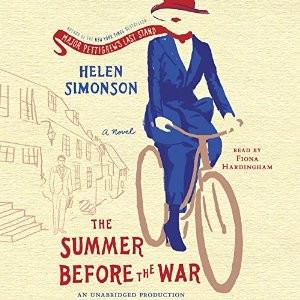 Narrated by Fiona Hardingham
Narrated by Fiona Hardingham
I saw a favourable review of the print version of this book recently and it inspired me to request the audiobook to review here at AudioGals. The Summer Before the War is not strictly a romance. It contains a subtle romance, yes and that romance does end happily but the story follows a number of characters from and associated with the small town of Rye in Sussex – and not all of them have a happy tale. I do recommend keeping the tissues handy.
Beatrice Nash is the daughter of a writer. She travelled extensively with her father, but when he died, she was left with the humiliating situation of having her inheritance tied up in a trust managed by her paternal aunt. Aunt Marbely had strict views on what the future should be for a genteel lady of marriageable age and Beatrice found herself in conflict with her. Beatrice has therefore accepted a position as Latin Mistress in the Rye Grammar School.
Agatha Kent, a prominent woman of Rye, was instrumental in getting the school governors to agree to hiring a woman for the job. Agatha is hoping Beatrice is plain. Alas, Beatrice is not.
Agatha and her husband John (a civil servant placed high within the Foreign Office), are childless but devoted aunt and uncle to their nephews, cousins Hugh Grange and Daniel Bookham. Hugh is a medical student shortly to complete his final exams. He is planning on becoming a brain surgeon. Daniel is a poet. They have both been coming to the Kent’s Rye house for the summer for years and years. In fact, their own parents are not really featured in the story at all – Agatha and John are parental figures for both of them.
1914 is a time of social upheaval, suffragettes are agitating for the vote and, shortly after the story begins, WWI breaks out.
For Beatrice, who has decided never to marry (famous last words, Beatrice), her position at the school is tenuous. She needs to be of impeccable character to remain in employment and increasingly strict rules placed by her aunt on her trust make keeping her position essential.
While it is never explicitly stated, it is clear from the text that Daniel is gay. 1914 is not a time when this was okay – in fact, it was illegal. Daniel has plans to spend time in France with his “friend” Craigmore but the war puts an end to such hopes.
Hugh is fairly sure he’s going to marry the daughter of his surgical mentor. He has been very subtle about his interest in her, of course (yeah, sure Hugh. Keep right on believing that) and has made no overt declaration but he intends to do so shortly. Why then, does Miss Nash keep intruding so thoroughly on his thoughts?
One of Beatrice’s students, “Snout” as he is called by most who know him, is the son of a Romany man. He is tolerated in the school but social strictures of the time mean he will struggle to rise higher than his birth.
A small group of Belgian refugees are taken in by the residents of Rye and their experiences begin to bring the war home to the locals. As well, the news is increasingly of bereavement and funeral notices rather than engagements and marriages. Agatha becomes increasingly worried about what might happen to her own beloved nephews as the war continues beyond initial optimistic estimates.
The story is gently deceptive. The pace is a little meandering but under the surface are all manner of trouble and strife for the denizens of Rye. While most of the story covers the summer war was declared, it does briefly follow the course of Hugh, Daniel and Snout (and, to a lesser extent, Beatrice and Agatha) during the war, and the brief epilogue takes place in 1920.
Because of its subtle, gentle tone, it almost comes as a surprise when Very Bad Things happen and the punch of emotion is heightened by the sheer unexpectedness of it all. Even though the book is set in and around a war, it feels like a genteel English countryside cosy story where nothing terribly serious occurs. The pace of the narrative and the early indicators in the text are deceptive however.
I think I’d have tired of the slowish reveal of the characters in print. I tend toward Wanting Something To Happen in my print reading. But I am far more patient with audio. Perhaps it is because I’m doing something else when I listen and so become distracted by how much time things are taking. Or perhaps the “doing/happening” aspect of my brain is occupied by my task and I therefore don’t require it of the book with the same immediacy. It’s a theory. In any event, I found this book a gentle delight for the most part, with pockets of outrage, sadness and grief for the tribulations and challenges of various of the characters. While there is a romantic happy ending it is nonetheless bittersweet and the novel ended for me on a melancholy note – perhaps entirely fitting, given the setting.
The narration, by Fiona Hardingham, is quite good. Her male characters are mostly differentiated by a certain sternness of tone rather than a deepening of pitch. Sometimes I found it difficult to tell whether it was Harry Wheaton, Hugh or Daniel speaking, as they sounded very similar and the text wasn’t always immediately helpful in identifying them. Ms. Hardingham did deliver a range of accents – French/Belgian, English upper class and English working class – however, which served to bring the large cast to life.
She also had the right cadence and tone for the times and the setting, which I think assisted in the process of me being lulled into the (false) sense of “everything is going to be all right, nothing truly bad can happen in such an idyllic town” I spoke of earlier.
In many ways, The Summer Before the War is a book of subtle subtext, peppered with grenades of overt action and the mix of these things left a definite impression on me. I came, gradually, to care deeply about the characters – a combination of the text and the narration which served, together, to make them feel very real. I was left with a more personal understanding of the impacts on everyday life WWI had on the population, distilled as it was through the lens of a few inhabitants of small town England.
Kaetrin
Narration: B
Book Content: B
Steam Factor: You can play it out loud
Violence Rating: WWI and all that implies. (Trigger warning: Sexual violence)
Genre: Historical Fiction
Publisher: Random House Audio
The Summer Before the War was provided to AudioGals by Random House Audio for a review.
[jwl-utmce-widget id=32435]




1 thought on “The Summer Before the War by Helen Simonson”
Comments are closed.